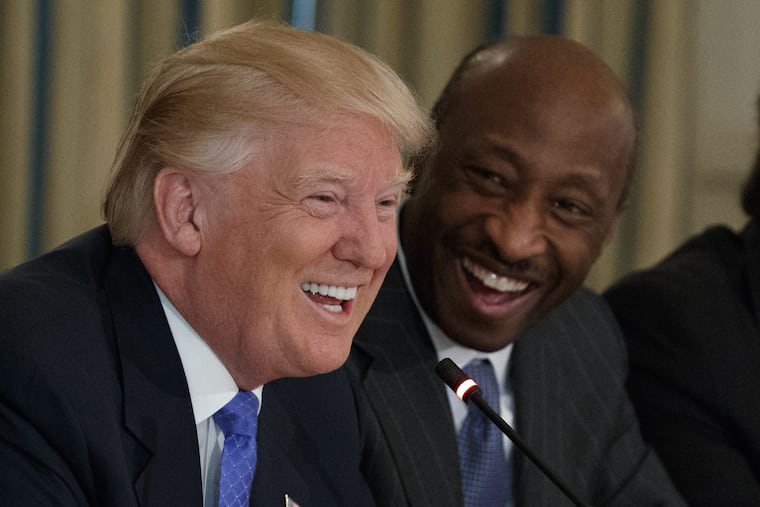Merck CEO Kenneth Frazier, speaking in Philly, urges people to call out ‘untruth, misinformation, and just plain BS’
The Merck CEO, the first African American to lead a major pharmaceutical company, reprised why he left Trump's manufacturing advisory council last year. He also condemned the National Rifle Association and expressed despair and anger over school and church shootings and police brutality.

An unexpected call came to Merck CEO Kenneth Frazier after he famously withdrew from Donald Trump's manufacturing council last year over the president's initial unwillingness to condemn the Charlottesville white supremacist rally.
"One of the most powerful Republican leaders in Congress phoned me to say — in the strictest confidence — how much he admired what he called my "courageous and principled stand," Frazier recalled Wednesday, speaking to about 500 members of the Philadelphia Bar Association gathered at the Bellevue Hotel in Philadelphia. "I thanked him. of course, for his kind sentiment. After he hung up, though, it struck me how those who would tear apart the ties that bind us now feel empowered to speak out strongly, while some who would seek to heal our divisions fear being seen as weak."
In a 20-minute speech, Frazier, the first African American to lead a major pharmaceutical company, reprised that incident. He also condemned the National Rifle Association, expressed despair over school and church shootings and police brutality, and took shots at politicians who "treat poverty as if it were simply a choice."
Frazier also condemned border separation practices and the way in which "religion has been weaponized to excuse or even justify all manner of ill–willed and ungodly behavior" after a direct reference to Attorney General Jeff Sessions' quoting of Romans 13 to defend the policy.
A native of North Philadelphia, Frazier delivered the Judge A. Leon Higginbotham Jr. Memorial Public Interest Lecture at the bar association's quarterly meeting. His speech focused on moral leadership in the tradition of Higginbotham, a federal judge who was previously active in the civil rights movement, and Dr. Martin Luther King, Jr.
Frazier also spoke about his upbringing: He grew up in an impoverished North Philadelphia neighborhood, his father was a janitor, his mother died when he was 12, and his grandfather was a sharecropper born into slavery. Frazier went on to receive a bachelor of arts degree from Pennsylvania State University and collect a law degree from Harvard Law School.
Merck, based in Kenilworth, N.J., is a major employer in the Philadelphia area. As of Dec. 31, 2017, Merck had about 69,000 employees worldwide: Locally, it is the top employer in Montgomery County and ranks 25th among the state's employers, according to the Pennsylvania Department of Labor and Industry.
Frazier came to Merck in 1992. He became general counsel in 1999 and CEO in 2011. Previously, he worked his way from "stranger in a strange land" as a junior lawyer at Drinker Biddle & Reath to become partner and argued a death row exoneration case that garnered national attention.
He inherited a major problem during the early part of his Merck tenure: Vioxx, a painkiller, hit the market in 1999 but was withdrawn by Merck in 2004, after it was shown to raise the risk of heart attacks. Frazier, then general counsel, opted to fight thousands of lawsuits. And Merck ended up spending $4.85 billion to settle those cases, far less than many analysts expected.
Merck under Frazier has seen its stock nearly double since 2011, though his tenure has coincided with a rising market. Merck's cancer drug Keytruda "has potential to be the largest product Merck ever had," Frazier said on the 2018 first quarter earnings call.
Frazier made national news in August 2017 when the "Unite the Right" march in Charlottesville, Va., on Aug. 12 to protest the removal of a statue of Robert E. Lee devolved into violence. The rally, organized by white nationalist Jason Kessler, turned violent when a man rammed a car into the crowd, killing one and injuring at least 19. In the chaotic aftermath, two state troopers also died and more people were injured.
Trump's initial decision not to condemn those white nationalist groups was widely seen as tacit support for white supremacy. Frazier responded by announcing his withdrawal from the President's American Manufacturing Council, an advisory group. Other executives soon followed, including the CEOs of chip maker Intel and sportswear firm Under Armour.
President Trump tweeted his displeasure, saying Frazier would now "have more time to LOWER RIPOFF DRUG PRICES." And his administration disbanded the council a few days later.
In his speech Wednesday, Frazier encouraged people to "join in what Dr King called a 'coalition of conscience:' We the people, regaining our moral voice to resist injustice, to call out untruth, misinformation, and just plain BS, and to shout kindness."
Democracy is "messy and not always comfortable," he said. "We can be right, after all, without being righteous or self–righteous."